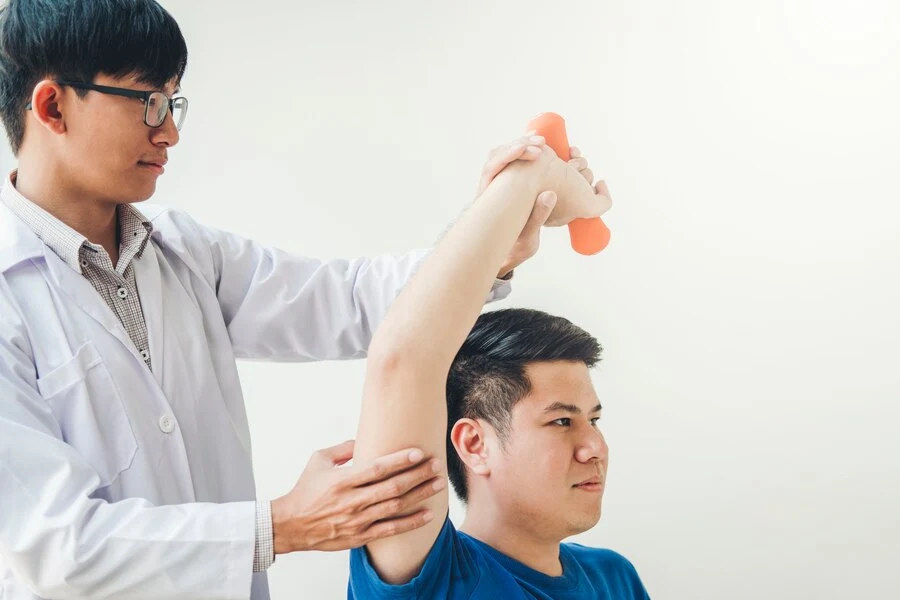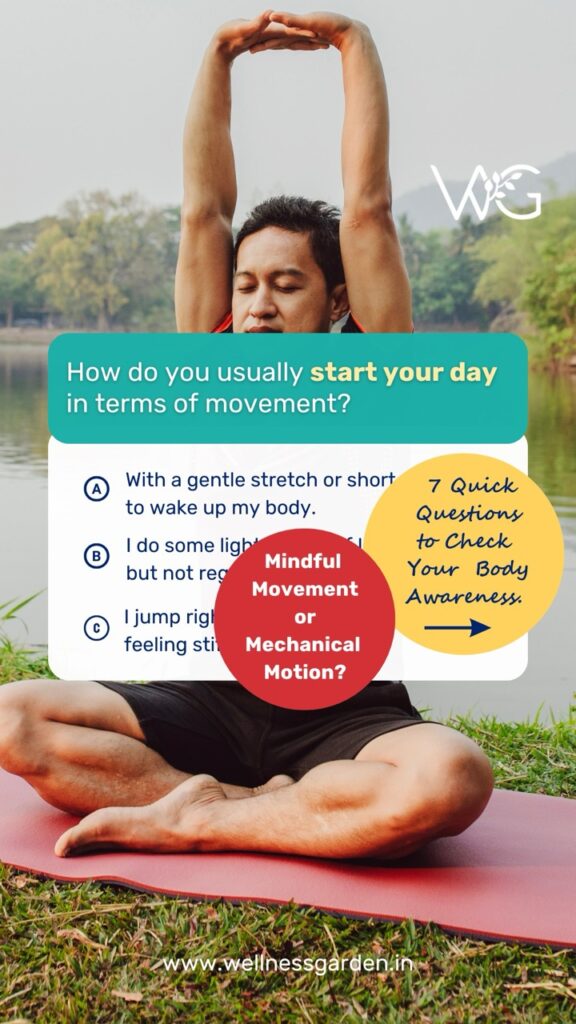Untie Your Shoulder Pain: Yoga Relief
- Movement
- 3 Min
- March 28, 2024
- Dr. Loren Fishman (M.D)
- exercise, Yoga & Meditation
Yoga is an age-old discipline that blends physical asanas, breathing techniques, and meditation.
Discomfort in the shoulders? It causes an imbalance in your fitness routines, conflicts with your daily coffee routine, and can even cause problems with a good night’s sleep. But in addition to being physically uncomfortable, shoulder pain can surprisingly affect your mental health. What if there was an option to treat this prevalent condition’s emotional and physical components as well? 
This article explores the origins of shoulder pain and its possible relationship to mental health. After that, we’ll discuss how yoga can help manage the mental and physical effects of discomfort in the shoulders. In a recent interview with YOGA U, Dr. Loren Fishman (M.D)a physiatrist — a specialist in physical and rehabilitative medicine affiliated with NewYork-Presbyterian/Columbia Hospital discusses using the Yoga technique to help more than 700 people avoid rotator cuff surgery.
Introduction
People of all ages might experience shoulder pain’s frequent and frustrating symptoms. It can present itself in many different ways, from a dull sensation that lasts for days to an unexpected, intense pain. Your everyday activities may be greatly impacted by this discomfort, which can make it difficult to move around and complete even the most basic chores such as getting dressed or grabbing for a cup.
The Wellness Garden offers yoga for shoulder pain since it promotes natural pain management. Gentle Hatha or Yin yoga could be a part of this for flexibility and relaxation. There are additional services like massage, acupuncture, and Ayurveda accessible. Here, we keep in mind individualized guidance and a secure method to controlling your shoulder discomfort, before beginning any new therapy.
The varieties of pain in the Shoulders
Pain in the shoulders can be very bothersome, and regrettably, it occurs frequently. According to the American Academy of Orthopaedic Surgeons, rotator cuff injuries are the primary cause of shoulder pain, which affects millions of Americans annually. Among the other reasons why shoulders hurt are:
- Bursitis from arthritis
- Aches in the muscles Tendinitis
- Movements
- Bad alignment
- Numbness or Tingling
- Burning Sensation
The link between the mind and body and shoulder pain
Although shoulder discomfort’s physiological causes are well understood. Research indicates that persistent pain, such as shoulder pain, maybe a factor in the development of mood disorders such as depression and anxiety. Since tension and worry can exacerbate feelings of pain, this two-way relationship may become vicious.
A key component of yoga practice is meditation. There are many different methods, but each of them entails focusing your mind on one thing, such as the breath or a mantra. By this form of meditation, individuals can develop inner peace and learn how to observe their thoughts and feelings.
The benefits of meditation on mental health are widely established. Research has indicated that it can lessen anxiety, stress, and depressive symptoms. Meditation assists people in finding inner peace and improving their ability to respond to obstacles by encouraging attention and control of emotions.
Relieving Yourself: The benefits of yoga
Yoga is a potentially effective treatment for shoulder pain and related mental health issues since it provides a comprehensive approach to well-being. Here are some advantages of yoga:
- Benefits for the body: Yoga positions help increase shoulder and adjoining muscle power, adaptability, and versatility in movement. While postures that strengthen the spine and hips can aid with posture and shoulder joint stress reduction, light stretching can help release tight muscles.
- Stress Reduction: Breathing techniques called pranayama, which are included in yoga, help people relax and concentrate. Yoga can help control stress chemicals like cortisol levels which can exacerbate perceptions of pain, by soothing the neurological system.
- Emotional benefits include improved self-awareness, emotional control, and general well-being.
- Yoga helps in sleep and helps more relaxing, more restful sleep.
- Pain management: It assists in treating long-term pain disorders such as arthritis and back pain.
Survey research
- The usage of yoga for shoulder pain was investigated in a 2020 survey that was released in the Journal of Alternative and Complementary Medicine. According to the study, people who took part in a 12-week yoga course experienced considerable increases in their overall health, operation, and discomfort in the shoulder.
Choosing your appropriate yoga type
Not every form of yoga is made equal, in particular when it comes to treating shoulder discomfort. The following advice can help you choose the ideal yoga practice:
- Find a Certified Instructor: Find a yoga instructor who has expertise in a style that meets the needs of new learners or those who have disabilities.
- Discuss Your Requirements: Let your instructor know about any restrictions you might be experiencing and about the discomfort in your shoulder.
- Take Care of Your Body: Avoid trying to cope with discomfort. As needed, adjust your poses to prevent further injuries.
- Begin Patiently: As your shoulder pain subsides, start with mild sessions of yoga and over time up the level of difficulty.
Note
An unpleasant and impairing ailment is shoulder discomfort. There is still hope for benefits through exploring holistic methods like yoga and appreciating the mind-body link. Yoga is an intriguing approach to managing shoulder pain and achieving improved mental peace because of its focus on physical wellness, reducing stress, and mental and physical awareness. Never forget that you should always get medical advice before beginning a new workout regimen, particularly if you currently have a medical issue.
If you’re interested in practicing the aforementioned yoga therapy under our guidance, feel free to get in touch with us for personalized Consultations and more.
A Word From WG Team
Wellness Garden is your committed partner in seeking comprehensive natural and holistic therapies to address all your pain and wellness requirements. Our approach encompasses the entirety of your body, mind, and environment, integrating body, mind, and nutrition therapy and various other techniques.
Whether you’re facing physical or mental health concerns, life hurdles, or simply aiming to enhance your overall well-being, we’re here to provide the support you need. Get in touch with us to explore the possibilities and embark on your journey towards holistic therapy and improved healing.
- Table of Contents
- • Introduction
- • Kinds of Pain
- • Benefits
- • Before Choose Your Yoga Type
- • A Word From WG
Recent Posts
Join Our Newsletter
End note from WG Team
Dr. Geetha Kamath
Take the next step in your wellness journey. Discover how our curated non-allopathic therapies can complement newfound knowledge at www.program.wellnessgarden.in or reach out for personalized guidance to our team at info@wellnessgarden.in.
Disclaimer: This information is provided for educational purposes and should not be construed as medical advice. Please consult with healthcare practitioners before undertaking any changes in wellness routines or adding new therapies.
Latest Blogs
Check out some of your blogs related to your interest.

- March 30, 2025
- Dr. Aviva Romm, MD
- 4 Mins

- February 17, 2025
- 4 Mins

- February 3, 2025
- Namrata Purohit
- 2 Mins







